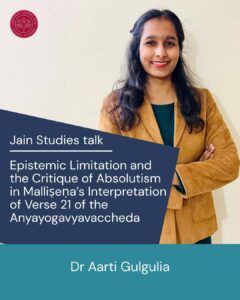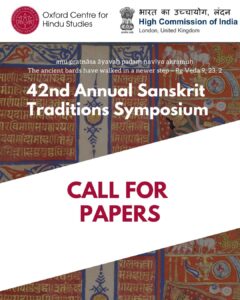Pragya Jain
Drawing on Arthur Koestler’s observation that meditation must be grounded in moral awareness rather than reduced to mechanical chanting, this talk investigates the layered conception of meditation in Jain philosophy. The Jñānārṇava, composed by Śubhacandra in the 11th century, provides one of the most systematic treatments of meditation in the Jain tradition. It emphasizes that meditation is not a uniform practice but exists in both inauspicious and auspicious forms. Inauspicious meditation, characterized by attachment, aversion, and delusion, is seen as the default state in which all living beings participate. The text then outlines the transformative role of śuddhopayoga (pure cognition) which enables the transition toward auspicious meditation, serving as the basis for right belief and ultimately leading to liberation.
Pragya Jain is a research associate at the International School for Jain Studies (ISJS) and a visiting researcher at the Oxford Centre for Hindu Studies (OCHS). Her research explores the theory of meditation in Jainism with special reference to Jñānārṇava. She has developed her research in dialogue with contemporary philosophy, including emerging intersections with AI and consciousness studies. She has presented and published her work on various international platforms like Religion Compass and serves as Assistant Editor of the academic journal ISJS-Transactions. Recently elected to the Executive Committee of the European Association for South Asian Studies (EASAS), she contributes to shaping interdisciplinary conversations in the field.




